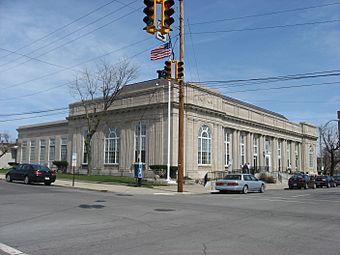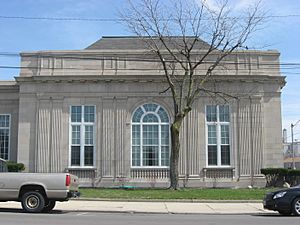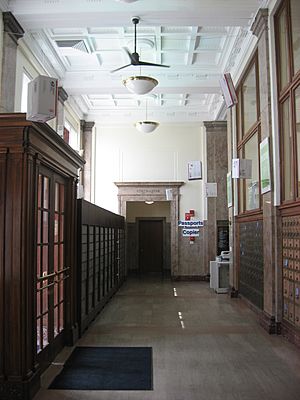United States Post Office (Lima, Ohio) facts for kids
Quick facts for kids |
|
|
U.S. Post Office
|
|

Front of the post office
|
|
| Location | 326 W. High St., Lima, Ohio |
|---|---|
| Area | less than one acre |
| Built | 1930 |
| Architectural style | Classical Revival |
| MPS | Lima MRA |
| NRHP reference No. | 82001356 |
| Added to NRHP | October 7, 1982 |
The United States Post Office in Lima, Ohio, is a historic building. It was built in 1930 and has a special style called Neoclassical. This means it looks like old Greek and Roman buildings. You can find it on High Street, just west of the city center. It's one of the newer big buildings in downtown Lima.
Contents
Why Was This Post Office Built?
The very first post office in Lima was at High and Elizabeth Streets. But as the city grew, people needed a bigger, newer building. So, they chose a new spot two blocks west for the new post office.
Lima's Growth in the Early 1900s
In the early 1900s, Lima was a very busy and important city. Companies like Standard Oil had a big presence there. Also, the Lima Locomotive Works, a local company, became famous for making locomotives (train engines).
This made the city's economy grow a lot. Many large buildings were built in and around the downtown area during this time. Even though the post office was built a bit later, in 1930, its design looks very similar to other grand buildings from that busy period.
What Does the Post Office Look Like?
The Lima Post Office was finished in 1931. It's a one-story building made mostly of concrete. The design is very grand and formal.
Outside the Building
On each end of the building, you can see special flat columns called pilasters. These pilasters have double grooves, which are called fluting. Below them are large windows with three sections, and a decorative railing underneath called a balustrade.
Other windows on the building are tall and narrow, with three panels high and two panels wide. Many of these windows have a small window above them called a transom. You can go inside through one of three double doors. These doors are placed between pairs of pilasters that look like carved columns.
Inside the Building
The inside of the post office is also very impressive. It's built mainly with beautiful marble and shiny wood. The ceiling is especially interesting, with a pattern of deeply contrasting marble squares called coffering.
Why Is This Building Special?
In 1982, the Lima Post Office was added to the National Register of Historic Places. This is a list of important places in the United States that are worth protecting. It was recognized because its architecture is very well-preserved and shows the Neoclassical style beautifully.
It was one of seventeen buildings in Lima that were added to the National Register at the same time.





